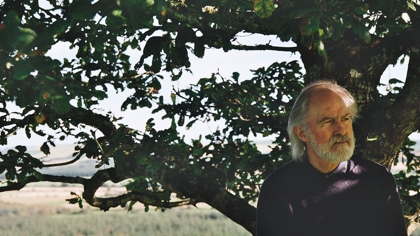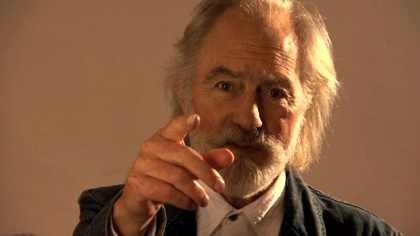Review
Roy Harper sings for the birds

Richard Grayson’s evocative video portrait places the songwriter in a complex lineage of British dissent, says Frances Morgan
The Magpie Index
Matt’s Gallery, London, UK
18 January–12 February 2012
As anyone who has interviewed a musician can attest, the worlds they create in melody, rhythm and lyric don’t always carry into conversation or submit to easy analysis, in text or on film. There’s no reason why they should: as songwriter Roy Harper himself suggests in Richard Grayson’s video portrait, song’s power to communicate is unique and mysterious, so compelling that exploring it has become, for him, a life’s work.
However, there are few other films ‘about’ music and musicians in which music is as deliberately and intriguingly absent as it is in The Magpie Index, in which Harper delivers a number of monologues to the camera. He recounts a little of his life on the fringes of the 1960s pop scene but holds forth mostly on politics, history, ecology and the world around him, from local birdlife to the possibility of colonising other planets. Against the calm backgrounds of a home recording studio and leafy garden, Harper cuts a composed but angry figure, simmering with the oppositional spirit that powered many of his generation.
This isn’t unexpected – at least if you’re at all familiar with Harper’s records and the counterculture that informed them – and neither are the attitudes towards religion (“It beggars belief!”), nor the environmental concerns, nor the discontent, close to disbelief, expressed at the “post-politics” of New Labour. But Grayson isn’t after great revelations or warm anecdotes; instead, he creates something like the opposite of a rock hagiography, tracing the knotty currents that run beneath an artist’s work while also making the case against separating art from its social and political context.

Grayson’s curation of Polytechnic, an exhibition of British video art of the 1980s at Raven Row in late 2010, likewise focused on not only the work itself but the radical, under-the-radar environment in which it was made. One crucial difference here, perhaps, is that while Polytechnic shone a light on obscurities, Roy Harper is now a well-loved figure whose seventieth birthday last year was marked with a performance at London’s Royal Festival Hall. It is therefore refreshing to see him in this different guise: not just a musical ‘hero’, but part of a complex lineage of British dissent.
That’s not to say The Magpie Index is devoid of lyricism. Harper’s verbal shifts in perspective, from local to global, personal to political, are echoed in Grayson’s editing, with the camera often lingering in tight close-up on the singer’s face. The detail and texture are rich, bright and pleasing.
Additionally, Harper is a formidable wordsmith; his sharp, urgent, image-rich lyrics have always been more than window-dressing, as important as the jazz-inflected fingerpicked guitar. This helps give The Magpie Index its motion, and provides its title: at one point, Harper muses that, should you want to chart the changes in Britain’s agricultural and urban make-up over the last half-century, you could do so by surveying magpie populations, a greedy breed that’s thrived as the small birds whose eggs he collected as a boy have declined. While Grayson’s video is for the most part not nostalgic, here is a flicker of loss, an idea of things stolen and gone for good, as well as a relationship with the landscape that goes beyond ecological concerns and is about something more deeply rooted, close to spiritual – sentiments, in fact, that are often best expressed in song.
See also
Trashy magic: Frances Morgan hears Alan Moore and Edwin Pouncey soundtrack Harry Smith in Fourth Dimensional Mind’s Eye Summoning (July 2011)
London’s burning: Frances Morgan on a special screening of Peter Watkin’s The War Game and Louis Bernassi’s burning-building montage Black Umbrella (February 2011)
Early British video art: Colin Perry reviews the Polytechnic show (September 2010)
Scott Walker 30 Century Man reviewed by Nick James (May 2007)
